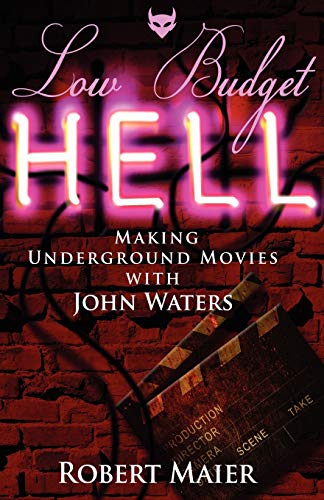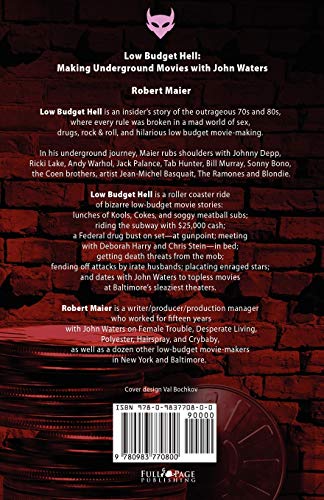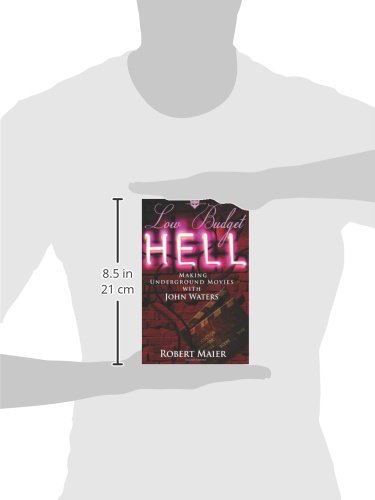Customer Services
Copyright © 2025 Desertcart Holdings Limited




Full description not available
K**
Timeless Wonder
I think it's time this book experienced a resurgence of strong interest. I don't know if it's been made into a documentary yet, but it would be a great one, vibrant and shining. Reading this book is like taking a long waterfall walk with your best friend and hearing all the stories of how life unfolded before you met each other. It's splendid. It isn't about John Waters; the star of the book is Robert Maier -- a writer, director, and producer whose work is well-known to many, and well worth discovering for a new generation. It's about a time when films felt real and alive, made for the big screens where watching one felt like a shared community event. This book's a romp back to the days before the Internet, and also a wild ride into the timeless wonder of friends flinging caution to the winds to bring something new into the world. It's even better than I hoped it would be.
A**L
Low Budget Hell - An Entertaining Cautionary History
Low Budget Hell succinctly tells the personal experiences of the author in the low budget film industy in the 70's and 80's. Mainly but not totally, under John Waters, he recalls events and how they affected him and the many people who sacrificed and worked their heart out trying to create films under crushing pressures and often incredibly unreasonable demands of often clearly sociopathic people intent on only their own visions and needs. Maier writes in a very smooth, pleasing style, like he is talking to a friend over a cup of coffee. He also creates the imagery that puts you comfortably there by his shoulder as he works in interesting situations with some people that are as good as gold, others that are flawed and damaged and yet fighting to stay relevant, and others that are near demonic in their nature. As in life, some of the situations are humorous and you often find yourself chuckling when you feel you shouldn't be, after all it is reality. What is described in low budget hell was intense, deadly serious, incredibly hard, sometimes passionate, and in some cases pathetic, especially in those cases where individuals would place themselves in positions of physical and mental abuse for the "artistic" vision or financial greed of people that really didn't give a damn for them but would use any means to get to their personal interpretation of "the top". The book also shows the many very good people that contributed and sacrificed much just to be a part of the "film industry"; a few succeeded, some failed, and many just got by until they found themselves kicked or pushed out. Maier, who apparently was able to hang on through the thick and thin much longer than most, does not get bogged down by details, he includes in a seamless style many of the challenges of the film projects he worked on and he finds different interesting things to say about each project, but but he does not dwell on any of them. You never get bored. You share his frustration and sometimes despair when working with often ill-spirited, selfish people. Yet, you also share his own amazement when most of the projects actually get completed despite all the odds, surviving the bizarre incidents and interference. You are introduced to the constant emotional and financial bribery in the low budget film industry, the constant swallowing of elephants yet choking at gnats mentality of low budget film producers and backers who are everything but professional. But occasionally you do meet a professional who is also a good human being. You also find yourself often in sympathy with many people that you would walk on the other side of the street to get away from. Maier succeeds in showing the humanity of some very bizarre folks and you find yourself linked to that person and their often bitterly hard lives that they tried to overcome, but as this is reality, some succeeded, some survived, some didn't. Of course you meet those that wallow in illegal, immoral, and self destructive behavior also. There is sleaze (especially in some mentioning of film content which was at times beyond the pale of any form of decency) but you do see at least in Water's films, an attempt at making things professional. The films themselves are only discussed in terms of the particular event of production described. You see people driven to desperate and sometimes underhanded behavior, usually needed to get what needed to be done, but also creating at times potential loss and damage to others. Occasionally you get to see some real stars in their more human form. Maier shows them as real people, often when they are working the business end of their "craft". And yes, you get interesting insight in what makes some creative people "tick", especially John Waters. You find out that there are little people and big people in the industry and rarely do they meet except in fleeting moments of creation. All of the above makes for a very entertaining and interesting book and I am glad the author has shared his experiences. There is much to learn from this book. You don't have to be a fan of John Waters, you don't even have to know him as you will learn about him in the book from Maiers personal perspective, and if perhaps you think you know him you might find something new in his personal dealings with Maier. There is something here for so many people, especially those who dream of creating something from nothing, especially on a low budget. But beware of the Hell that awaits....the human cost which will never be "low budget".
R**D
Low Budget Hell
by Rob GoaldLow Budget Hell: MakingUnderground Movies with John WatersBy Robert MaierFull Page PublishingDavidson, North Carolinac. 2011 John Waters does not want you to read this book! Why? Well let's just say that Mr. Waters is revealed, in this compelling and engaging account, to have many flaws that are more reprehensible than simply being known as the "Pope of Trash". He is defined as a very calculating and ambitious person who stepped on many people on his way to international celebrity and great fortune. Mr. Maier clearly labels him a fop and describes how he sold-out friends who helped him to the top. But, this book is so much more than that. It is the first book, that I can recall, that explains how difficult and trying it is to make motion pictures outside of the mainstream. It clearly paints a picture of what it was like to make movies in `low-budget" hell. Maier describes in excruciating detail how actors and crew worked in the freezing cold and were fed the cheapest fast food (Cokes, cold cheese pizza and soggy meatball subs) that the production could get away with. It also describes time and time again how funding just wasn't there to pay crew the money they were promised and how he had to battle with vendors to get the best deals possible. The author, Robert Maier, grew up in Towson, Maryland, a suburb of Baltimore, and, befriended Waters in his first real job after graduating from American University as a "techie" in the film department at UMBC. It seems that Waters was seeking film equipment that would allow him to make his transgressive films on a tiny budget. What better place to get his career going than with Maryland State owned cameras, recorders and editors paid for by taxpayers? It wasn't long before Mr. Maier hung out drinking and watching Russ Meyers' movies with Waters at Baltimore's Rex Theater. He eventually resigned from his college staff position and became a sound recordist and later a production manager on five John Waters's films starting with Female Trouble and ending with Crybaby. The book also is a fun romp through 70's and 80s. Mr. Maier pursues projects without Waters such as a section of the book he labels Andy Warhol's Cocaine Cowboys where a wanna--be filmmaker named Tom Sullivan blew millions of dollars he made in cocaine running on a film whose primary mission was to make sure that his Danish supermodel girlfriend was living her fantasy as a movie star. Numerous sexual escapades are described and even The Ramones show up to party and play music Maier meets up with Johnny Depp, Ricki Lake, Andy Warhol, and even Jean-Michel Basquait. He buys a Basquait painting which he sells for 10k at a Sotheby's auction years later to help bail himself out of debt. He describes carrying 25k in cash on the subway as part of his Low Budget production management duties and facing gunpoint from Federal Narcotics Agents. He relates constantly moving from Baltimore to NYC and the incredible 18-20 hour days he worked for very little monetary remuneration. The next to last chapter on Crybaby spells out definitively how Maier felt abused and let down as Water's budgets grew into the millions. He related that it was time to get out and find work in public television and education. "Low Budget Hell" is an honest and heartfelt account of what it was like to work outside the Hollywood arena. It pulls no punches and will deliver an indelible portrait of the times. It should be mandatory reading for all film majors at our nation's colleges and universities.
J**C
An interesting insider look at the pros/cons of low budget film making
I liked this book for a # of reasons: 1} Maier writes in an easy to read conversational style -- sort of like hanging out with an old friend over drinks. 2) his subject - especially as it regards the films of John Waters Dreamland, is of especial interest to me as I knew a number of the actors in my own youth, so it was interesting to read of his experience. 3) having toyed with the idea of film-making myself, a peek into his experiences of low budget, gave me a shot of reality, All in all an interesting read and should be so for all low budget and Dreamlander fans.
Trustpilot
1 month ago
2 days ago